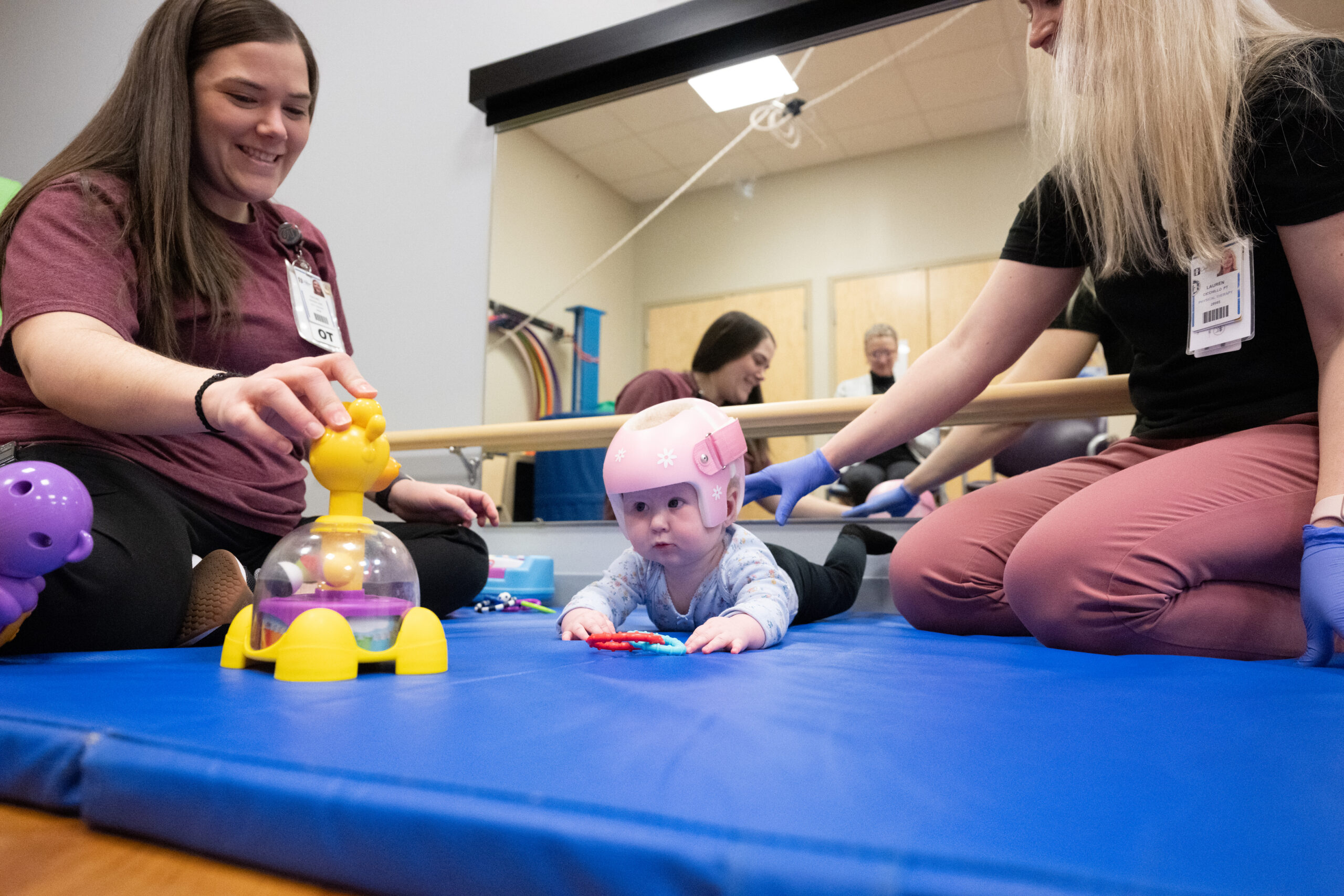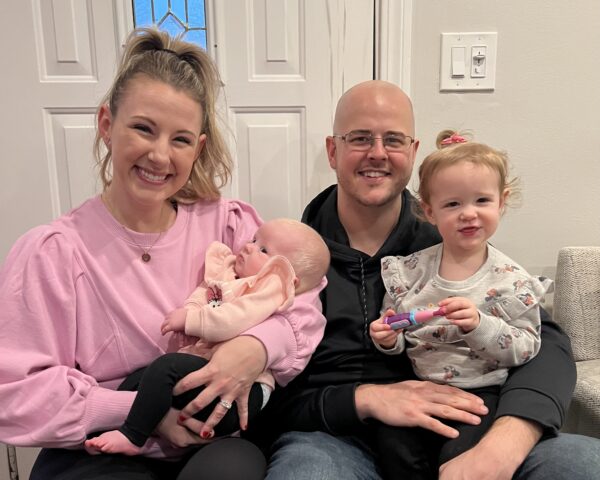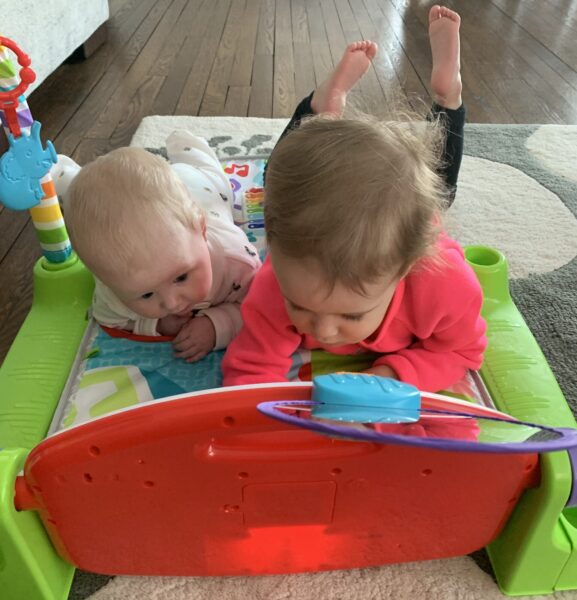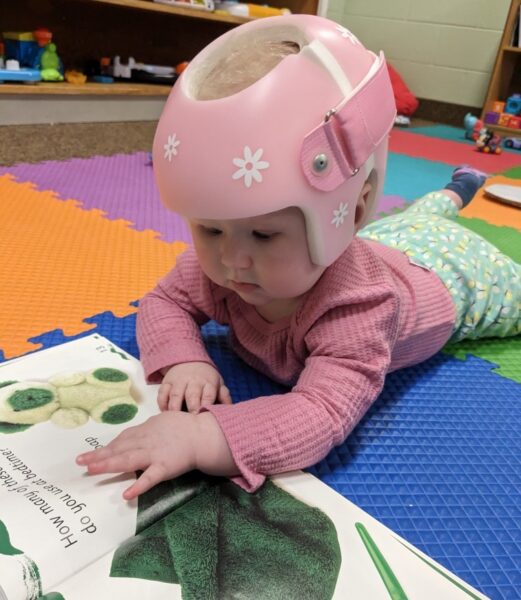
Jayda Hampton was diagnosed with Prader-Willi syndrome and began therapy at 4 months old. Her treatment has been life changing for the family. Here, she’s working on pushing up onto her hands during tummy time.
Warren native Michele Hampton’s pregnancy was typical: She had common pregnancy discomforts, a growing belly (and swollen ankles) and a baby that was developing normally. In fact, it was very similar to her first healthy pregnancy, so when Michele was induced at 40 weeks, her and her husband, Andrew, were excited and eager to meet their newest addition.
But once baby Jayda was born, it wasn’t anything like Michele’s experience with her firstborn, Joelle. Jayda wasn’t crying, and doctors struggled to regulate her body temperature and blood sugar. She was barely awake and alert, and had a weak suck, which made her first feeding very difficult. Doctors said Jayda was suffering from failure to thrive because her height and weight did not match standard growth charts.
“Doctors told us that sometimes babies are undernourished and slow to start, but it can be easily corrected at home with extra nutrition and a regular feeding plan,” said Michele. “We were hopeful that’s all it was. We didn’t spend any time in the NICU and returned home as planned a few days later.”
Confirming a Prader-Willi diagnosis
It wasn’t until Jayda’s first few visits with her pediatrician, Akron Children’s Therese Linnon, DO, that it became evident something else was going on. At her first-week appointment, Jayda had lost a whole pound and wasn’t wetting diapers regularly. Weighing in at just 4 pounds, Dr. Linnon was concerned and recommended the family admit Jayda to Akron Children’s for further evaluation.
“Jayda’s muscle tone was so low that she could barely support her tiny body,” said Dr. Linnon. “I was concerned she had a neurological condition that was potentially life-threatening. So, I sat down with the family, calmly instructed them on what to do and what to expect in hopes of easing their worried minds.”

Jayda enjoys incredible support from her parents, Andrew and Michele, and older sister, Joelle. They’re looking forward to more one-on-one time this summer break to build on Jayda’s progress.
While in the hospital, the main focus was getting Jayda nutrition, as she wasn’t getting enough through breastfeeding because her ability to suck was too weak. Jayda had a gastrostomy tube, or feeding tube, surgically placed.
In addition, many specialists, including a pediatric neurologist, geneticist, gastroenterologist and pediatrician, evaluated Jayda. Clinical geneticist Catherine Ward-Melver, MD, noted Jayda’s almost floppy limbs, in addition to excessive sleepiness, a weak cry, poor suck and swallowing abnormalities, along with other characteristics typical of Prader-Willi syndrome: light skin tone, light hair and eyes.
So, Dr. Ward-Melver ordered blood and genetic testing to check for the rare genetic condition caused by an abnormality on the 15th chromosome. Prader-Willi causes low muscle tone, short stature if not treated with growth hormones, incomplete sexual development and a chronic feeling of hunger, which can lead to excessive eating and life-threatening obesity. In addition, behavioral problems, learning disabilities and other cognitive issues are common.
“When Dr. Ward-Melver called to confirm the diagnosis, we were definitely taken aback, especially after a healthy pregnancy,” said Michele. “We’re so thankful for her insight, however, and the time she spent with us to discuss Prader-Willi and what’s next for Jayda. She also connected us with valuable resources, such as Help Me Grow and Prader-Willi Syndrome Association, which has been tremendous support to meet other families in similar situations.”
Treatment for Prader-Willi syndrome
With a confirmed diagnosis, the family had a clear path forward and could focus on treatment, as early intervention would be key for Jayda’s future success and development.

The family celebrates milestones that are common to others, but very special to them, such as Jayda being able to now interact with her older sister.
At 4 months old, Jayda began a daily injection of Human Growth Hormone, in which she is deficient, to help strengthen and improve muscle mass, bone density and stamina.
In addition, she has physical therapy once a week to improve physical development and muscle tone. She’s working on sitting up independently, pushing onto her hands during tummy time and gaining more control of her movements. Jayda also has occupational therapy to build skills for everyday activities, such as hand coordination, picking up objects and transferring them between hands.
To help with bottle feeding—and hopefully removing her feeding tube one day soon—Jayda also has dietary and speech therapy.
“Jayda’s treatment has been life changing, and she’s grown and developed by leaps and bounds in the last 4 months,” said Michele. “She’s meeting milestones at a quicker rate, simple things like lifting her head and turning it side to side, rolling onto her belly and using her hands. The support we’ve received is incredible. Akron Children’s discovered what was going on and quickly put in place what we needed to set Jayda up for success, and we are so thankful for that.”
What’s next for Jayda?
While there is no cure for Prader-Willi, Michele and Andrew have confidence Jayda will succeed, especially with the support of care all around her and witnessing how far she’s come since birth 8 months ago.
“Jayda is doing phenomenally,” said Dr. Linnon, who sees Jayda regularly to keep an eye on her overall health and weight. “Now that we have a diagnosis, we also have all the appropriate consulting providers on her care team to provide the very best care. While Jayda has some obstacles to overcome, I’m confident her progress and future success are limitless.”

Jayda enjoys playing with her toy rings, books and ball, and she’s doing well picking them up and passing them between hands.
Today, Jayda enjoys playing with her toy ring, books and ball, and is doing well picking them up and passing them between hands. She’s now giggling, which she couldn’t do before due to low muscle tone, and interacts with her 2-year-old sister.
“I’ve thrown out the typical milestone track and just focus on what she’s conquering next,” said Michele. “The cool thing is we’re seeing things that many parents don’t necessarily notice. We say to each other, ‘She just grabbed her toy rings!’ We’re celebrating milestones that are so common to others, yet very special to us.”
A teacher by day, Michele is looking forward to more time with Jayda this summer to build on her tremendous progress. She hopes to start liquids by mouth and try different food textures to build on Jayda’s continual feeding improvement. She also plans to help Jayda progress in her physical therapy work to sit up independently.
“We will continue to guide and encourage Jayda, one day at a time, to get stronger and push forward so she can reach her fullest potential,” Michele said. “We look forward to watching this strong, brave girl grow and meet her milestones. We hope she knows how proud of her we are because she is amazing!”










